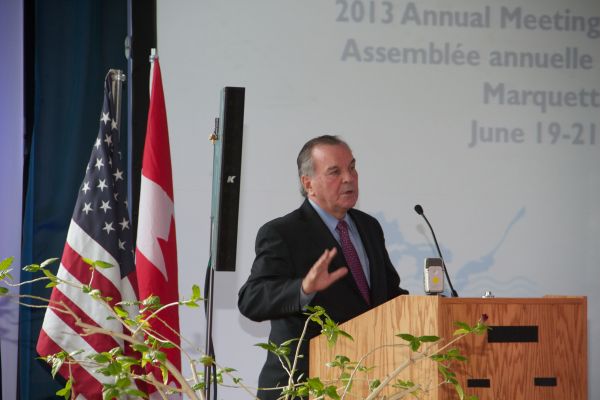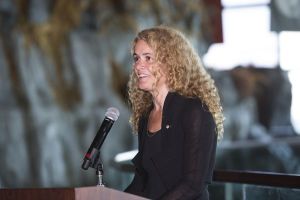
Recently at Shedd Aquarium, world-renowned Canadian astronaut Julie Payette shared views of the Great Lakes from her former vantage point in space, in honor of our new At Home on the Great Lakes exhibit opening.
As she scrolled through sky-high images of Chicago, Green Bay, Toronto, Rochester, one thing became clear. Even from thousands of miles above the atmosphere, the satellite pictures reflected the uniqueness of each city along the Great Lakes, revealing the distinct ways that the lakes shaped the evolution of every community on their shorelines -- and the ways our cities shape the lakes in turn.

This bi-national leadership is critical because, as Payette noted during her talk, watersheds do not conform to political or municipal boundaries. As a result, GLSLCI continues to demonstrate that when it comes to getting Great Lakes restoration done, cities are often where the rubber meets the road. Together, the 103 mayors speak for the unique identities, needs and priorities of the more than 16 million people they represent, in order to develop solutions for Great Lakes issues that integrate the entire basin's environmental, economic and social concerns.
At this June's GLSLCI annual meeting in Marquette, Mich., the mayors shared their cities' unique perspectives on the Great Lakes' most pressing issues, including climate change adaptation, the coastal impacts of historically low water levels, mining and economic development. While extremely necessary, this work isn't always easy. After all, we have to establish common ground between eight states, two provinces, countless communities and federal, state, provincial and tribal and First Nations governments. Fortunately, there are many cross-border organizations working to reflect these stakeholders' diverse perspectives, including the GLSLCI, Great Lakes Commission, International Joint Commission and Council of Great Lakes Governors.
While these groups continue their efforts, we also need you. Saving our Great Lakes can only happen if all points of view are considered, and your voice matters. In every Great Lakes community, there are opportunities to get involved with the lakes. Whether you attend a city shoreline planning meeting or volunteer for a beach restoration day, you'll be adding your energy to a bi-national conservation effort.
No matter what you do, do something: Now is your chance to share your thoughts on the next five-year plan for the Great Lakes Restoration Initiative. Public comments are due July 12; click here to submit yours or click here to send an email.